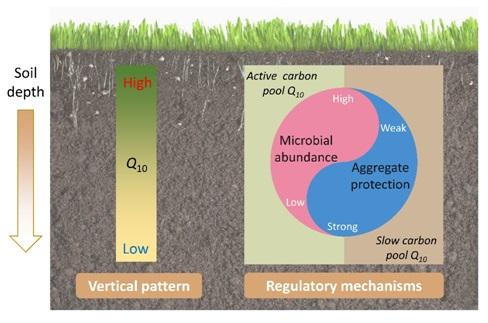
Credit: Yang Yuanhe
The temperature sensitivity of soil organic matter (SOM) decomposition, commonly referred to as Q10, is a key parameter in the terrestrial carbon cycle. It quantifies the increase in the rate of decomposition corresponding to a 10oC rise in temperature and can determine the sign and magnitude of terrestrial carbon-climate feedback.
The regulatory mechanisms involved in the temperature sensitivity of SOM decomposition has been a topic of great interest among the global change research community over the last 20 years. However, comprehensive analyses involving the roles of substrate, environment and microbial properties in regulating Q10 have been limited.
Recently, a research team led by Prof. YANG Yuanhe from the Institute of Botany of the Chinese Academy of Sciences elucidated the mechanisms underlying vertical variations in Q10. Based on the natural gradient of soil profile in Tibetan alpine grasslands, the team collected soil samples at two soil depths and then conducted long-term incubation, SOM decomposition modeling and manipulative experiments.
The team found that lower microbial abundance and stronger aggregate protection were coexisting mechanisms underlying lower Q10 in subsoil. Substrate quality and mineral protection were less responsible for Q10 variations.
Further analysis revealed that regulatory mechanisms differed between various carbon components. Microbial communities were the main determinant of depth-associated variations in Q10 in the active carbon pool, whereas aggregate protection exerted more important control in the slow carbon pool.
These results revealed the crucial role of soil carbon stabilization mechanisms in regulating the temperature response of SOM decomposition, and provided important insights for accurately understanding the feedback between the terrestrial carbon cycle and climate warming.
###
The paper, entitled “Temperature sensitivity of SOM decomposition governed by aggregate protection and microbial communities”, was recently published online in Science Advances.
This study was supported by the Strategic Priority Research Program of the Chinese Academy of Sciences, the National Key R&D Program of China, the National Natural Science Foundation of China, the Key Research Program of Frontier Sciences of the Chinese Academy of Sciences, and the Chinese Academy of Sciences-Peking University Pioneer Cooperation Team.
Media Contact
Jin Shuo
[email protected]
Original Source
http://english.
Related Journal Article
http://dx.




